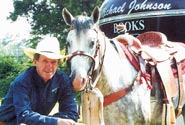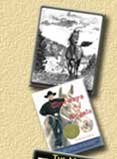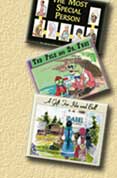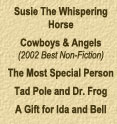
Michael's Monthly Column "Throwing My Loop"

Throwing My Loop…
By: Michael Johnson
The Texas Writer Wes Ferguson
I was always a reader. Such an odd behavior for someone who
made such poor grades in my younger years. Read everything I
could get my hands on and took a private pride in doing so.
Yet there was something that troubled me, and something I
would never admit to any grown-up. I couldn't get the famous
people.
If any teacher assigned someone like Hemingway,
Fitzgerald, or Thomas Wolfe, all the air went out of me.
Just couldn't get them. When I read their words, I only felt
endless boredom...and embarrassment because I probably
wasn't “smart enough to understand them.” Then something
happened. Somewhere along junior high, I began to find
people I could “hear.” The first was the rough, tough
detective novel scribe Mickey Spillane. The ultimate tough
guy, he was born in Brooklyn (naturally), became a fighter
pilot (naturally), and as you might expect, his father was
an Irish bartender. He wrote about Mike Hammer, the
hard-boiled, cynical private eye who only had two friends
when he faced the bad guys...his .45 and the half-pint of
Jack Daniels inside his jacket. I never had to read a line
of Spillane's twice. His writing, it was said, was “clean
and to the bone.” Then just out of high school, I found
James Kirkwood...
Kirkwood wrote There Must Be a Pony, Some Kind
of Hero, P. S. Your Cat is Dead, and A Chorus Line,
among others. Never had to read a line twice. His words were
sticky. I still have them in my mind. And there were others.
Especially the Western novelist Elmer Kelton, a man who
became my mentor and friend who still helps me to this day,
even though he died in 2009. I felt some sadness in the last
few years due to the fact it has been so long since I felt
that way about any writer – and doubted I ever would again
but...I found one – the Texas writer named Wes Ferguson.
Reading a story on my porch one day about an old
trot-line fisherman on the Sabine River. First of all, I
didn't know there were any fish in the Sabine. It's just a
pitiful little slough where I live. But as I read on, I
learned there was so much I didn't know.
Then the author says, “If the Rio Grande was a river
out of Lonesome Dove, the Sabine seems a river out of
Deliverance.” As I read on about the old fisherman, I began
to hear the distinct sound of wind chimes. Since we don't
have any on that side of the house, I was puzzled until I
realized the sounds of chimes were coming from me — from my
memory of an old man I knew as a child. The old trot-liner
who fished on the mighty Red. The one who had wind chimes on
his front porch. That was when I looked for the author's
name and found it to be Wes Ferguson. Later I would read
more stories by Wes Ferguson and I could hear him. Then I
read Angels in East Texas. I really heard him then.
In that story, Ferguson tells the tale of a time – some
twenty years ago now – when he was a reporter for the
student newspaper at Kilgore College in East Texas. That
young reporter covered a story about the decision to produce
a controversial play at the college. This self-described
former “high school football player from the oil fields of
East Texas” – gently causes us to ask where would we have
stood in the fray? Would we dare commit what the Greeks
considered the greatest sin – hubris – to question the Gods?
Would we actually question some of the more “rigid rules” we
are raised with in the places where we live? Ferguson helps
us to see such actions on our part must surely be one of the
most unsettling experiences of our lives. To risk being
ostracized and banished by family and friends or to chance
becoming a better human being – which would you choose? When
I finished that story, I felt myself feeling shaky – like I
had been unloading feed most of the day. My goodness, what a
piece – and the good times weren't over.
Next I read two books by Ferguson about rivers in
Texas. One being the aforementioned Sabine and the other the
Blanco, in the Hill Country of Texas.
In Running the River, Ferguson shares a trip he
took with friend and photographer Jacob Botter down the
Sabine, beginning at the headwaters of the river near Lake
Tawakoni in East Texas near where I live, and ending some
550 miles later in the Gulf of Mexico. (I do wish my
seventh-grade Texas history teacher had a copy back then.)
The journey is full of fascinating facts, and even more
enjoyable are the stories and lives of the people Ferguson
encounters along the way. He says, “There is just something
about rivers that attract people who have an aversion to
authority.” He tells us about those “river rats” who live
off the grid, floating on 55 gallon drums tied together with
a few boards on top, complete with a rope tied to the big
cypress on the bank. The ones who trot-line, and
“telephone,” and might kill sixteen squirrels in one day –
the ones my daddy knew and the same ones I knew. Of course,
Ferguson was talking about the Sabine, and I was talking
about the mighty Red, the Sulphur River in East Texas, and
the Little River in southeast Oklahoma, but they were all
the same people. And the author made me aware of something
else...
When Ferguson asks his friend Jacob Botter to accompany
him on the river excursion, Botter replies, “The Sabine?
Why? It's just mosquitoes, snakes, and a few alligators.”
Ferguson says, “Because we are from Sabine, Texas. We
went to Sabine High School. That's our river. We should
celebrate it.” After reading those words, my mind returned
to someone else who had that same wisdom.
My friend, mentor, and second father, Dr. Jerry Lytle,
felt that way about the Bois D'arc tree where we live. “It's
our tree,” he said. “It doesn't grow in too many places on
the earth.” For much of his adult life, Jerry would find a
particularly gnarled and twisted small limb from the
“Maclura Pomifera” or “Osage Orange” as the bois d'arc is
also known – the tree Indians made their bows from due to
its strength – and after hours of scraping, sanding, and
polishing, Jerry would present the piece of wood, that now
seemed almost alive, to his friends and loved ones with a
card that read...
“The bois d'arc has strength and beauty like the
friendship I share with you.”
Thanks to both Dr. Lytle and Wes Ferguson for reminding
me to treasure the blessings we take for granted.
Ferguson's winding and twisted journey on the Sabine
generated a number of feelings. Sometimes I felt gritty and
grimy after reading about his struggle with a low muddy spot
or sometimes sore and afraid, after experiencing his
frightening encounter with a dangerous log jam. But when he
and photographer friend Jacob reached the Gulf, I was there
with them. Here are his words at that moment...
“A journey that had begun in the blackland prairie
outside Dallas, drifting through the pine hills of
northeastern Texas, nourished by muddy creeks, slipping
through the land where we grew up, had come to end in the
blue expanse of the Gulf of Mexico. The hot Gulf sun warmed
the surface of the sea. Clouds formed. Rain would fall: the
river's endless cycle. Jacob and I fished for a spell, and
then we went home.”
And sitting in my study – just like I did in the
sixth-grade at the Saturday afternoon movie when the cavalry
came charging over the hill... I stood up and cheered.
– Michael Johnson
Wes Ferguson is a Senior Editor
at Texas Monthly Magazine
In 2019, he was inducted into the Texas Institute of
Letters.
His books, Running the River: Secrets of the Sabine and
The Blanco River, can be purchased at Amazon or at his
website, wesferguson.net

BLUE and MIGUEL
 |
|||||
|
|||||
|
|
|||||
|
|
|||||
|
|
|||||
|
|
|||||
|
Healing Shine |
|||||
|
|
|||||
|
|
|||||
|
|
 |
|
Please stop |
|
|
|
Send Michael |
Michael Johnson Books
michaelspeaks@msn.com
1172 CR 4122 Campbell, Texas 75422 (903) 413-5167

webmaster







